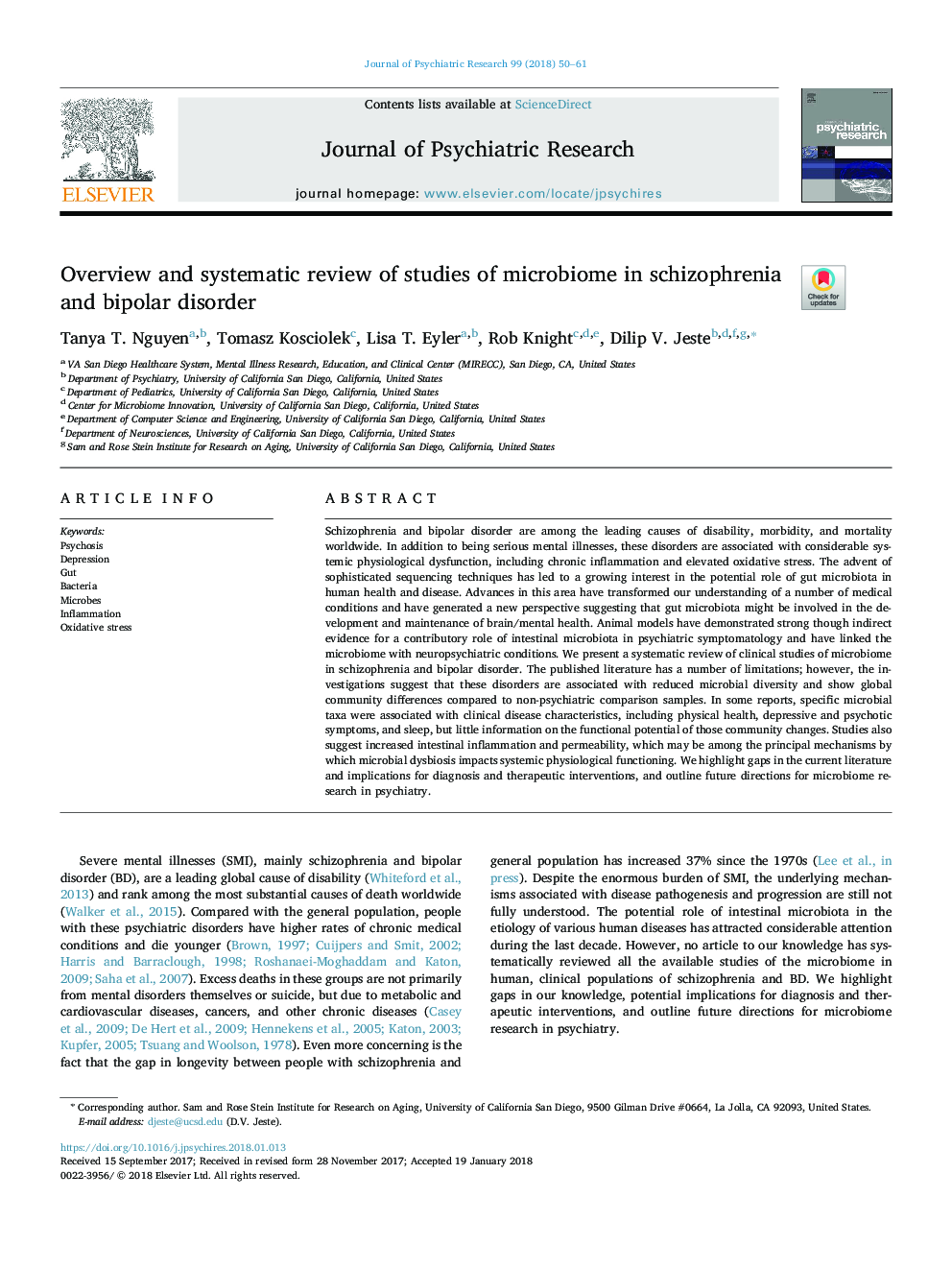| کد مقاله | کد نشریه | سال انتشار | مقاله انگلیسی | نسخه تمام متن |
|---|---|---|---|---|
| 6799636 | 1433294 | 2018 | 12 صفحه PDF | دانلود رایگان |
عنوان انگلیسی مقاله ISI
Overview and systematic review of studies of microbiome in schizophrenia and bipolar disorder
ترجمه فارسی عنوان
بررسی و بررسی سیستماتیک مطالعات میکروبیوم در اسکیزوفرنی و اختلال دوقطبی
دانلود مقاله + سفارش ترجمه
دانلود مقاله ISI انگلیسی
رایگان برای ایرانیان
کلمات کلیدی
روانپریشی افسردگی، خلط، باکتری، میکروب ها، التهاب استرس اکسیداتیو،
ترجمه چکیده
اسکیزوفرنی و اختلال دوقطبی در میان علل اصلی ناتوانی، بیماری و مرگ و میر در سراسر جهان هستند. علاوه بر داشتن بیماری های روانی جدی، این اختلالات با اختلالات فیزیولوژیک سیستمیک، شامل التهاب مزمن و افزایش استرس اکسیداتیو همراه است. ظهور تکنیکهای توالی پیشرفته منجر به علاقه بیشتر به نقش بالقوه میکروبیوتاسیون روده در سلامت و بیماریهای انسان شده است. پیشرفت ها در این زمینه درک ما از تعدادی از شرایط پزشکی را تغییر داده اند و چشم انداز جدیدی را پیش بینی کرده اند که می گوید ممکن است میکروبیوتاسیون روده در توسعه و حفظ سلامت مغز / سلامت دخیل باشد. مدل های حیوانی شواهد قوی و غیرمستقیم برای نقش مهمی در میکروبیولوژیک روده در علائم روان شناختی نشان داده اند و میکروبیروم را با شرایط عصبی مرتبط می دانند. ما یک بررسی سیستماتیک از مطالعات بالینی میکروبیوم در اسکیزوفرنی و اختلال دوقطبی را ارائه می دهیم. ادبیات منتشر شده تعدادی محدودیت دارد؛ با این حال، تحقیقات نشان می دهد که این اختلالات با کاهش تنوع میکروبی همراه است و تفاوت های جامعه جهانی را در مقایسه با نمونه های مقایسه غیر روان درمانی نشان می دهد. در بعضی از گزارش ها، تاکسون های خاص میکروبی با ویژگی های بیماری بالینی، از جمله سلامت جسمی، علائم افسردگی و روان شناختی، و خواب، اما اطلاعات کمی در مورد پتانسیل عملکرد این تغییرات جامعه مرتبط بود. مطالعات همچنین نشان می دهد التهاب روده و نفوذپذیری روده ای را افزایش می دهد که ممکن است در میان مکانیسم های اصلی که دیس بیوئیک میکربی بر عملکرد فیزیولوژیک سیستمیک تأثیر می گذارد، باشد. ما شکاف های موجود در ادبیات فعلی و پیامدهای تشخیص و مداخلات درمانی را برجسته می کنیم و جهت گیری های آینده برای تحقیقات میکروبیومی در روانپزشکی را ارائه می دهیم.
موضوعات مرتبط
علوم زیستی و بیوفناوری
علم عصب شناسی
روانپزشکی بیولوژیکی
چکیده انگلیسی
Schizophrenia and bipolar disorder are among the leading causes of disability, morbidity, and mortality worldwide. In addition to being serious mental illnesses, these disorders are associated with considerable systemic physiological dysfunction, including chronic inflammation and elevated oxidative stress. The advent of sophisticated sequencing techniques has led to a growing interest in the potential role of gut microbiota in human health and disease. Advances in this area have transformed our understanding of a number of medical conditions and have generated a new perspective suggesting that gut microbiota might be involved in the development and maintenance of brain/mental health. Animal models have demonstrated strong though indirect evidence for a contributory role of intestinal microbiota in psychiatric symptomatology and have linked the microbiome with neuropsychiatric conditions. We present a systematic review of clinical studies of microbiome in schizophrenia and bipolar disorder. The published literature has a number of limitations; however, the investigations suggest that these disorders are associated with reduced microbial diversity and show global community differences compared to non-psychiatric comparison samples. In some reports, specific microbial taxa were associated with clinical disease characteristics, including physical health, depressive and psychotic symptoms, and sleep, but little information on the functional potential of those community changes. Studies also suggest increased intestinal inflammation and permeability, which may be among the principal mechanisms by which microbial dysbiosis impacts systemic physiological functioning. We highlight gaps in the current literature and implications for diagnosis and therapeutic interventions, and outline future directions for microbiome research in psychiatry.
ناشر
Database: Elsevier - ScienceDirect (ساینس دایرکت)
Journal: Journal of Psychiatric Research - Volume 99, April 2018, Pages 50-61
Journal: Journal of Psychiatric Research - Volume 99, April 2018, Pages 50-61
نویسندگان
Tanya T. Nguyen, Tomasz Kosciolek, Lisa T. Eyler, Rob Knight, Dilip V. Jeste,
